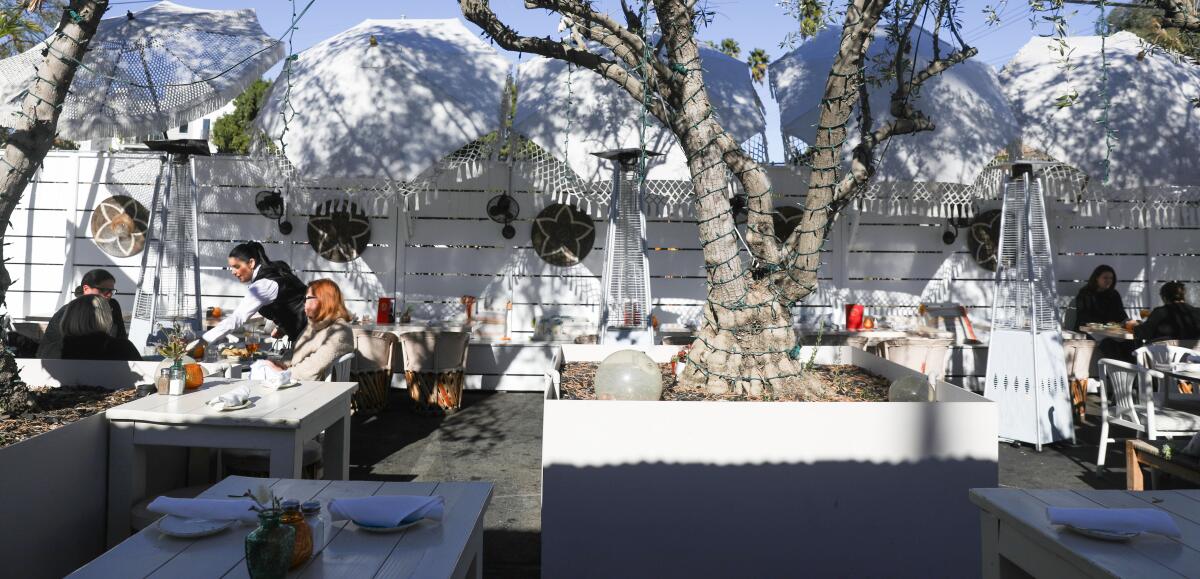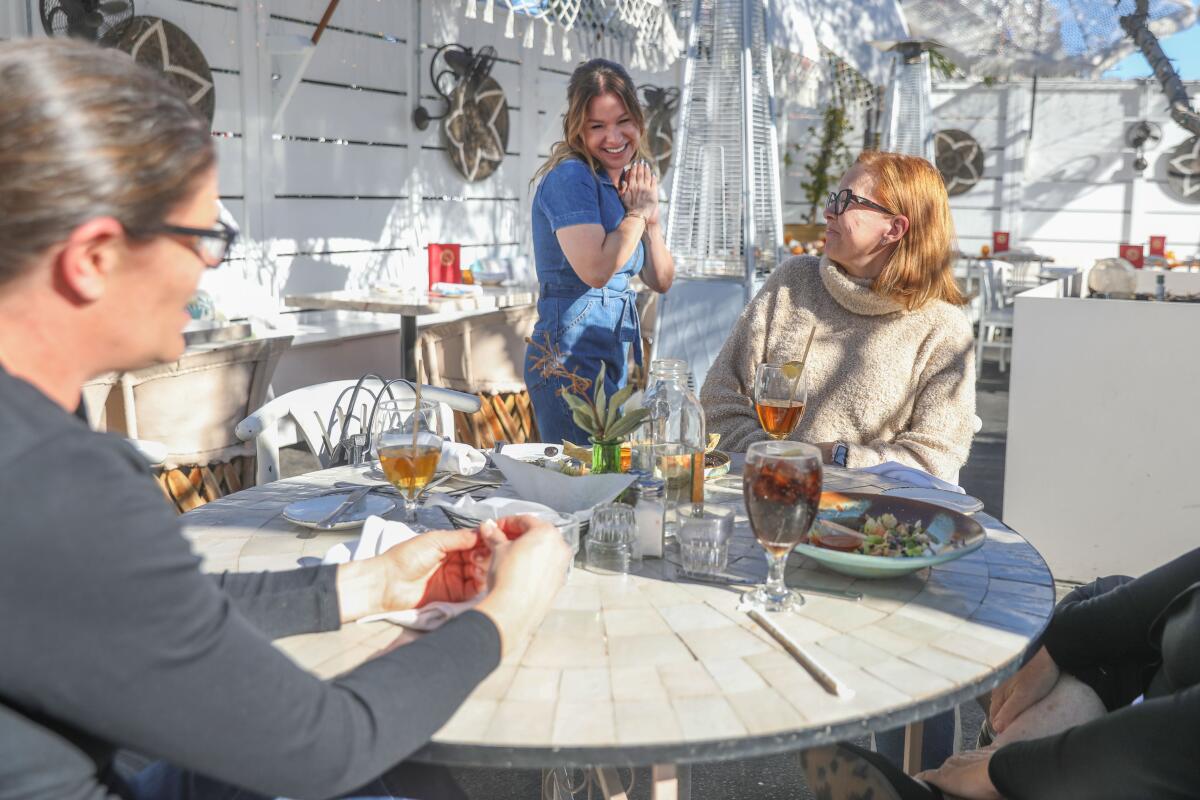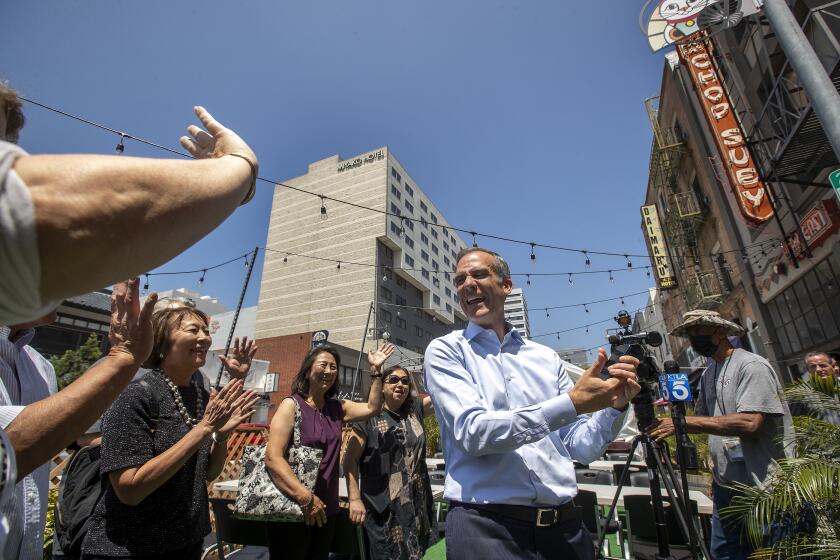After more than a year of discussion, L.A. is ready to make outdoor dining permanent

- Share via
When the L.A. Al Fresco dining program was established in 2020 in the midst of the COVID-19 pandemic, Christy Vega said it saved her 67-year-old family-owned restaurant.
The program let restaurant owners bypass red tape to quickly set up outdoor dining areas, a necessity during the pandemic.
For Vega’s Sherman Oaks restaurant, Casa Vega, this meant converting two parking lots into outdoor dining space, a change that made it possible for Vega to continue to serve customers and pay her employees.
“It was wildly vital to our survival,” she said.
The city is now moving to make the program’s relaxed regulations permanent, allowing restaurants to continue operating outdoor space without pre-pandemic zoning restrictions. The Los Angeles City Council signified its commitment to alfresco dining with a vote Friday requesting the city attorney draft an ordinance to make the program permanent.
It’s a victory for the restaurant industry and for communities accustomed to eating outside, but some business owners and residents say the city’s new version of the program isn’t perfect.
A last-minute amendment to the ordinance mandates that restaurants include one parking spot for disabled people on their property, a requirement that would effectively eliminate outdoor dining space for smaller businesses, Vega said.
Mayor Eric Garcetti is tweaking L.A.’s Al Fresco dining program, which city officials may make permanent in the fall. Changes include better sidewalk accessibility.
“It’ll kill alfresco for anybody that doesn’t have a giant parking lot,” she said.
For the record:
3:01 p.m. Dec. 8, 2023An earlier version of this article said Christy Vega said she would lose $12 million in revenue if she had to make space for a disabled parking spot with room for a vehicle to back out and turn around. The correct figure is $1 million.
Vega said she would have to take down her patio and lose $1 million in revenue if she had to make space for a disabled parking spot that also includes room for a vehicle to back out and turn around. To avoid that, she said, she’s spent $60,000 trying to obtain a conditional use permit to keep her patio permanently.
In an effort to protect small businesses, the City Council on Friday added an exception to the parking space requirement for restaurants with 3,000 square feet of indoor space or 1,000 square feet of parking space or less.
Conner Lundius, a 30-year-old Burbank resident who uses a wheelchair, said disabled parking spots are essential for safety and inclusivity. She can’t eat at a restaurant if there isn’t a space for her, she said.
“I don’t feel like this exemption is really quite fair,” she said. “I’m dining out in L.A. every weekend and the first thing that I look at when it comes to trying a new restaurant is what the parking situation is.”
Without a disabled parking spot, Lundius said, restaurants are missing out on business and excluding customers who are disabled.
“We’re consumers and customers just like everyone else,” she said. “It really doesn’t send the right message.”
While Vega said she is grateful for the exemption, other owners say it’s not enough.
“Square footage has nothing to do with the size of the business,” said Brittney Valles, who sits on the board of the Independent Hospitality Coalition and owns Guerrilla Tacos in downtown Los Angeles. “It shouldn’t be a requirement at all.”
Valles, who has enough outdoor space for dining and a disabled parking spot, said the rule could be devastating for many restaurants who don’t.
“I think that there are a lot of restaurants that would have to rethink whether their business is feasible without outdoor dining,” she said.
Councilmember Tim McOsker, who introduced the exception to the parking requirement, said at Wednesday’s council meeting that he was trying to strike a balance between supporting alfresco dining for small businesses and ensuring accessibility for disabled customers.
Implementing a permanent alfresco program has been a long road for the City Council and the restaurant community. City officials first drafted an ordinance in November 2022 and have spent more than a year receiving public comment.
The initial ordinance required restaurant owners to navigate a complicated process to get their outdoor dining approved, Valles said.
“It was going to be this overbearing process that costs restaurants a lot of money and made it very complicated to do basically what we’re already doing,” she said.
To reach a compromise, Valles and her fellow restaurant owners agreed to a ban on outdoor ambient music, which is prohibited by the temporary program. Live music is also prohibited.
Venice resident David Feige said the current ban on ambient music is not enforced in his neighborhood, and the new version of the alfresco ordinance doesn’t do enough to create enforcement mechanisms.

There are several unpermitted outdoor speakers at restaurants on his block near Washington Boulevard that are disruptively loud, he said.
“If we close all the windows, turn on the noise machine and we can still hear the music in our bedroom, that’s a problem,” he said.
Although the ordinance includes the establishment of a hotline for complaints and says the public can contact the Department of Building and Safety to report a violation, Feige said those measures will be ineffective.
“The minute they see the cops coming, they turn it down,” he said of the restaurants with speakers, “and 10 minutes later, they turn it back up. There is no meaningful ability for redress here.”
Feige spoke at Tuesday’s Planning and Land Use Management Committee meeting and said he was representing more than a dozen of his neighbors. He called for a complaint-based system, in which a restaurant gets cited or shut down if it receives too many complaints.
Get the lowdown on L.A. politics
Sign up for our L.A. City Hall newsletter to get weekly insights, scoops and analysis.
You may occasionally receive promotional content from the Los Angeles Times.
Vega also said enforcement is an important issue. Only a handful of restaurants play disruptive music, but she doesn’t want them to ruin the reputation of the alfresco program.
But Vega said she is most worried about the parking space measure and the restaurants that may have to lay off employees after shutting down outdoor space.
“Restaurant workers have not had any financial security or job security since the pandemic,” she said. “The No. 1 gift of this program was that we were able to get our employees back to work.”
Restaurant owners say they hope the new version of L.A. Al Fresco will run just as smoothly as the first. The original program during the pandemic was “the absolute easiest thing” to take advantage of, Valles said.
“This was such a beautiful, simple win for restaurants when it launched in 2020,” she said. “We just want to keep it that way.”
More to Read
Sign up for Essential California
The most important California stories and recommendations in your inbox every morning.
You may occasionally receive promotional content from the Los Angeles Times.












